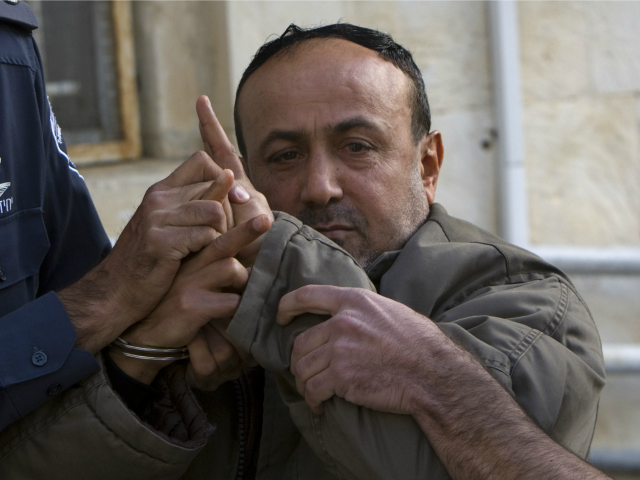TEL AVIV – The families of terror victims murdered by jailed Palestinian terrorist leader Marwan Barghouti blasted the New York Times for giving him a platform by publishing his op-ed earlier this week.
Barghouti is serving five life terms plus 40 years for murdering several Israelis and a Greek Orthodox monk during the Second Intifada, of which he was one of the architects.
Barghouti, who is a chief contender to succeed Mahmoud Abbas as president of the Palestinian Authority, penned the article to explain why he had launched a hunger strike among Palestinian prisoners in Israeli jails, claiming abuse by prison guards, including his own claim of being kicked in the genitals.
The original article included a bio describing Barghouti only as “a Palestinian leader and parliamentarian,” conspicuously omitting his terrorist past. Following an outcry, the NYT amended the bio.
Shmuel Landau, the father of 17-year-old Ronen Landau, who was killed in a July 2001 roadside shooting attack near Jerusalem that was orchestrated by Barghouti, slammed the NYT for whitewashing Barghouti’s past.
“I would show the [NYT editors] pictures of my late son, who can no longer speak out. Terrorists went out and murdered children on the orders of a so-called ‘political leader,'” Landau told Hebrew news site nrg, adding that he would tell the NYT, “This is what happens when you present him as a ‘freedom fighter.’”
“He should not be given any concessions whatsoever,” Landau said, referring to Barghouti’s demands for improved prison conditions. “He is a terrorist leader. He is a murderer, but he acts as if he’s the head of a workers’ union. I don’t think he needs any leniency.”
Shlomo Chen, who lost his wife and mother of his two children Yoela in a 2002 shooting attack near Jerusalem, said, “I have nothing to say to [the New York Times].”
“Those who killed my wife will never be free,” he said. “I won’t agree to it.”
Tzion Sviri, whose son Doron, daughter Sharon and son-in-law Yaniv Ben-Shalom were killed in a shooting attack in August 2001, said, “Every week I visit the graves of my murdered children … my hope is that Barghouti sticks with the hunger strike until the end so that [someday] his children will have to visit the cemetery each week in order to speak to him.”
Sviri further blasted the suggestion that Barghouti should be released early. “Anyone who speaks this way, none of them were hurt and none of them know the pain of a bereaved family. I’d wish them this pain and then they’d talk differently.”
The New York Times was roundly condemned by Jewish groups in the U.S. and by Israeli lawmakers, including, chiefly, Prime Minister Benjamin Netanyahu, who said that calling Barghouti a political leader is like calling Syrian President Bashar Assad a children’s doctor. On Monday, MK Michael Oren, who also served as Israel’s ambassador to the U.S., said that the incident merited the shuttering of the New York Times’ Jerusalem bureau.
“If someone in the paper helped him [smuggle the article out of prison], the New York Times should be held accountable,” said Oren.
Following the outcry, the Times later added the following editor’s note to the oped:
This article explained the writer’s prison sentence but neglected to provide sufficient context by stating the offenses of which he was convicted. They were five counts of murder and membership in a terrorist organization. Mr. Barghouti declined to offer a defense at his trial and refused to recognize the Israeli court’s jurisdiction and legitimacy.
On Tuesday, Public Security Minister Gilad Erdan said Barghouti may be prohibited from meeting with his lawyers if they are found to have helped smuggle his op-ed to the the New York Times.

COMMENTS
Please let us know if you're having issues with commenting.